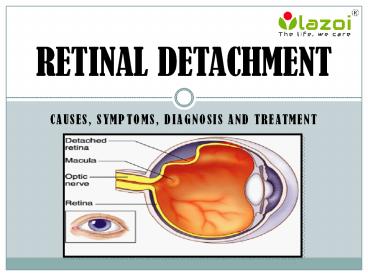Retinal Detachment: Causes, Symptoms, Diagnosis and Treatment. - PowerPoint PPT Presentation
Title:
Retinal Detachment: Causes, Symptoms, Diagnosis and Treatment.
Description:
Retina is a layer of tissue at the back of the eye, which helps to see images focused on it by the cornea and lens. Retinal Detachment is an eye disorder, wherein the retina gets separated from the underlying layer of blood vessels, which supplies oxygen and other nutrients to it. When the retina gets detached, the supply of oxygen and nutrients are stopped. If the condition is left untreated, it may even lead to a complete vision loss and blindness. To know more visit here: www.lazoi.com – PowerPoint PPT presentation
Number of Views:527
Title: Retinal Detachment: Causes, Symptoms, Diagnosis and Treatment.
1
RETINAL DETACHMENT
- causes, symptoms, diagnosis and treatment
2
What is Retinal Detachment ?
- Retina is a layer of tissue at the back of the
eye, which helps to see images focused on it by
the cornea and lens. Retinal Detachment is an eye
disorder, wherein the retina gets separated from
the underlying layer of blood vessels, which
supplies oxygen and other nutrients to it. When
the retina gets detached, the supply of oxygen
and nutrients are stopped. If the condition is
left untreated, it may even lead to a complete
vision loss and blindness. There are three types
of retinal detachment - rhegmatogenous
- tractional
- exudative
3
Symptoms of Retinal Detachment
- Sudden appearance of flashing bright lights,
especially in the peripheral vision - Vision becomes blurred
- The individuals experience illusions that some
small objects like spots, hairs, or strings ,are
moving in the eye (called floaters) - Blindness in the affected eye
- A shadow keeps appearing in the vision field
4
Causes for Retinal Detachment
- Bending or drooping of the vitreous that can
occur with advancing age, due to a change in its
consistency - Advanced stages of diabetes
- Trauma/injury to the eye
- Any eye inflammatory disorder may trigger retinal
detachment
5
Risk Factors of Retinal Detachment
- Adults above the age of 40 years
- A previous occurrence of retinal detachment
- A family history of the condition
- Individuals with severe nearsightedness
- Any previous eye surgery, like cataract removal
- Congenital abnormalities affecting the eye
- Any trauma or eye injury (including head injury),
experienced previously - Use of certain eye drops (like pilocarpine for tre
atment of glaucoma - a condition of elevated eye
pressures) - Certain disorders affecting the eye, such as
chronic inflammation of the eye (known as
uveitis) - Participation in certain rough/contact sports,
like boxing
6
Diagnosis of Retinal Detachment
- Physical examination and evaluation of complete
medical history - Electroretinogram
- Measuring the intraocular pressure
- Fluorescein angiography
- Ophthalmoscopy
- Refraction test
- Retinal photography, which aims to project the
photographs of the inner surface of the eye - Visual acuity
- Slit-lamp examination
- Ultrasound of the eye
7
Treatment of Retinal Detachment
- Most individuals suffering from retinal
detachment would need a surgery, either
immediately or after a short time. When the eye
condition is mild, then surgery may be performed
using lasers to close the holes/tears in the
retina or Pneumatic retinopexy in which gas
bubbles are placed in the eye, in order to make
the retina go back to its original place.
8
Prevention of Retinal Detachment
- Use of protective eye wear is recommended, when
working with hammers, lawn mowers, weed-eaters,
fireworks, or any similar equipment that can
cause an eye injury - All diabetic individuals are advised to keep
their sugar level under control consistently - Consultation with an eye specialist at least once
a year is recommended, especially for elderly
adults and those who are at risk for a retinal
detachment
9
For More Updates
- Logon
- www.lazoi.com
- Like us on Facebook
- https//www.facebook.com/LazoiTheLife/
- Follow us on Twitter
- https//twitter.com/lazoithelife
- Follow us on Pinterest
- https//www.pinterest.com/lazoithelife/

